Posts Tagged ‘work life balance’
You receive a meeting request for August 5th. Your calendar is open, so you accept the request. You get asked to visit an out-of-state client on August 12th. Your calendar is open, so you say yes. You’re asked to make a presentation in place of a team member who is out of town, on August 14th. You want to be a team player, so you say yes. And soon what was a relatively slow month is booked with meetings, travel, and other commitments. Mid-month you’re tired, over-extended, and resentful. You want to be a good team member and a responsive professional. How do you do both without feeling tired and resentful?
One of the best pieces of advice I heard many years ago was to decide how to handle something before the situation presents itself. For example, if you’re trying to lose weight and you’re going to an event that will have an amazing buffet, decide what you will and won’t eat before you arrive. Choosing not to eat the desserts will be much easier if you’ve made that decision before the event rather than when you’re standing in front of temptation. Managing commitments and schedules can work the same way.
Before having a child, I worked 80 hours a week and traveled up to six days a week. And I loved every second of it. After having my son, I realized that I didn’t want to keep that kind of schedule anymore. I needed to cut back. So, I created clear and specific boundaries for myself. I decided how many days a month I would travel, by what time I needed to arrive home from each trip so I could see my son before he went to sleep, and how many speaking engagements I would commit to each month. When I receive speaking requests, I honor my pre-established boundaries. If I am already on the road the maximum number of days I told myself I would travel, I ask if the client can do a different month or if I can speak virtually. If the answer is no, I turn the work down.
I rarely deviate from my established boundaries. And when speaking requests come in, the decision-making isn’t a struggle. I don’t have to decide if accepting a request will be too much. I’ve already made the hard decisions about the schedule I will keep. So, each incoming request either fits into my already-decided-schedule or it doesn’t.
I work for myself. I have latitude to make decisions about my schedule that I might not if I still had a regular, corporate job. So how do you make and share decisions when you’re not your own boss?
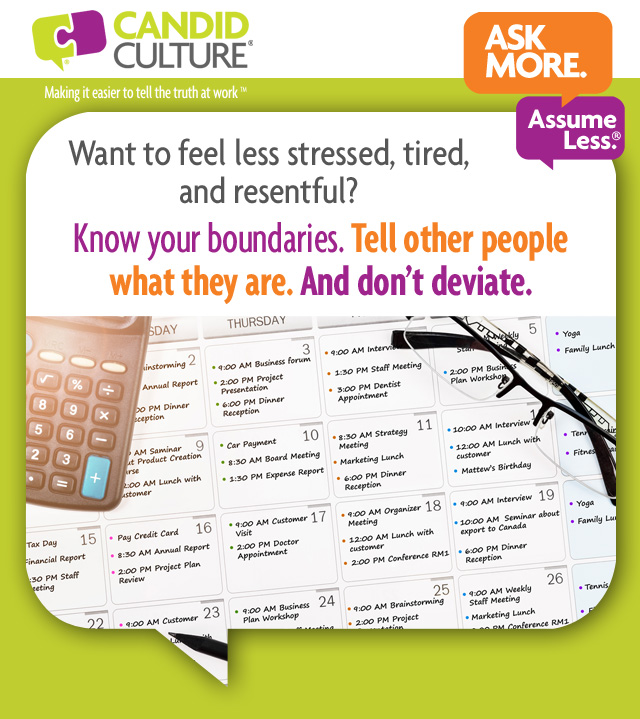
Decide what you want your schedule to look like. How many hours do you want to work a week? What time would you like to start and stop working on most days? How much travel are you willing and able to do? How many meetings can you attend a day and still get your work done, so you’re not working each evening or weekend?
Then communicate your desired schedule to the person you work for. Tell your manager how much travel you would like to do and the hours you would like to work. Then negotiate. You may not be able to maintain the schedule you want all the time, but you certainly won’t if you don’t make your desires known.
The time to tell your manager that you want to reduce your travel is before you’re asked to take a trip, not after. But it’s never too late. If you find yourself too busy or on the road too much, you can always have a conversation and renegotiate.

It’s not easy to admit when we’re overwhelmed and need help. In fact, it’s such a hard thing to say that instead of asking for help, most of us either work harder or longer or job hunt. Admitting work overload isn’t a weakness and it isn’t bad. It’s all in how you handle it.
If you find yourself with work overload and you aren’t sure what to do, consider taking these four steps.
Eliminate work overload step one: Every time you find yourself doing something that someone else could and should do, write it down, including how much time the task took. Doing this will create awareness of how much time you spend doing things that may not be the best use of your skills and experience. Then work with whomever you need to in your organization to align that work where it belongs. This practice isn’t to make you sound like an entitled prima donna. It’s an entrepreneurial way to approach your work.
The business owner’s mantra is, “If I can pay someone less than I get paid to do something, I should do that.” Consider how you can apply that practice to your workplace, without appearing to be someone who won’t ‘wash windows.’ Meaning, you don’t want to be or appear to be someone who isn’t willing to do grunt work. Every job has it. But those tasks shouldn’t be where you spend most of your time unless your job description and annual goals say so.
Eliminate work overload step two: Watch out for and eliminate time suckers. This includes people, problems, and processes. If you find yourself in meetings all day long, consider which meetings you don’t really need to attend or send someone else on your team. If someone in your organization calls you daily to have personal conversations, tell the person, “I’d love to talk with you and I’m working under a deadline. Can we catch up later?”
Eliminate work overload step three: Sometimes doing 110% percent isn’t important. Notice when you’re doing more than you need to and when that additional work doesn’t add significant value. I.e., you put together an elaborate PowerPoint presentation and then spent five more hours printing and stuffing folders to mail to coworkers’ homes. Next time, focus on the content and worry less about the aesthetics.
Eliminate work overload step four: Lastly, know when and how to ask for help. The last organization where I worked, before starting Candid Culture, was very fast-paced and lean. I worked all the time and consistently felt overwhelmed. I eventually went to my boss to ask for help. I made a list of everything I was working on and asked him to rate each item based on how important he saw the project/task. He put an “A” next to the things that needed to get done first, a “B” next to the things that came next, and a “C” next to the things that were the least important. He told me to do the A’s first, then the B’s, and if I got to the C’s, great, if not, no problem.
The meeting was eye-opening for me. I assumed he thought everything on my list was an “A” and that left me stressed with an inability to prioritize. Hearing how he perceived my workload reduced my anxiety and gave me permission to ease up on projects I’d previously considered timely.
Don’t suffer in silence. But do approach reducing work overload in a positive way. Rather than whining to your boss and coworkers, end conversations that you know are a time drain, limit work that doesn’t add significant value, and ask for help prioritizing when you can’t do it for yourself.
When my son asked that I not be on my phone on his birthday, I cried. I was surprised. I’m a very attentive parent. I spend a lot of time with my son. And apparently, as he has noticed, I also spend a lot of time with my phone.
There is always a good reason (excuse) for looking at my phone. I’m self-employed. I run a business. It’s important to be responsive to current and potential clients. But is every message timely? Urgent?
It’s become obvious – I’m addicted to my phone. I take it everywhere. I check it constantly. It’s such a habit, I don’t even see myself pick up the phone and check for messages.
Many people’s response to Covid was to move cities, switch jobs, continue working from home, and possibly work less. People are yearning for more balance and freedom. Yet, we are addicted to our phones, attached like they are a lifeline.
I regularly get calls from clients telling me that employees are tired and over extended – burnt out. They want a way out. Burnout is an organizational issue that begins and stops with strong management and leadership. One thing individuals can do to protect their time and separate work from their personal lives, is to put the phone away. By the way, next week’s tip is about how to prevent burn out.
The phone takes our attention and a lot of time, I suspect more time than we realize. When I’m focused and working during the day and hear that little ping of a text message, I stop working to check my phone. It’s a quick message, so I reply. Then the sender replies. Then I reply. Soon it’s been 20 minutes. Where was I with my work again?
These distractions can happen a few times a day. Then I pick my son up from school and lament how little I got done that day, and wonder when I’ll have time to finish my work? After my son’s asleep? In the morning before he wakes up? Instead of doing something I enjoy at night and sleeping in the morning, I’m trying to regain lost time.
Burnout is a systemic, organizational issue. But we can create boundaries with our phones today and regain some time and focus.

Here are the things I’m trying:
- I leave the phone face down when I’m working and only turn it over if it rings. My son’s school doesn’t text when there is an emergency, they call.
- My phone is on silent if my son is home and I’m not expecting a timely call or message.
- I put my phone in another room when he is home, so I’m not tempted to look at it.
- I leave the phone on another floor during my son’s bedtime routine, so that time is uninterrupted.
I don’t always do these things consistently, but I’m more aware of my addiction now. I’m conscious and I’m trying.
The key to taking back our time and having a balanced life is boundaries. A clear boundary (a rule you create for yourself) makes decision-making easier. There is no struggle, no internal fight. You are simply following the guidelines you put in place for yourself.
For example, if you decide to quit eating sugar for 30 days and go to a party where the sweets look really amazing, that experience will be stressful without a clear boundary. “I’m not eating sweets.” Not, “I’m not eating sweets unless they look really good.”
The same is true for the hours we work and work travel. If I set a boundary that I only travel one night a week and never miss two consecutive bedtime routines with my son, it’s easy to say no to work that doesn’t fit those boundaries, no matter how much I’d like to do that work.
Our phones can be the same. If you want to be less tied to your phone, set boundaries. “I only check my phone at the top of the hour. Then I put it on silent until the next hour.” “I’m available via phone, email and text until 5:30 pm each day, then I don’t check or respond to message until 8:30 am the next day.” Whatever boundaries you establish, tell the people around you who are impacted.
If your boss is used to getting responses at 8:00 pm, tell them the change you’re making and tell them why. If friends or family are used to hearing back from you within minutes, adjust their expectations.
You don’t have to be tied to your phone like it’s a member of the family. It’s a tool, not an extremity.
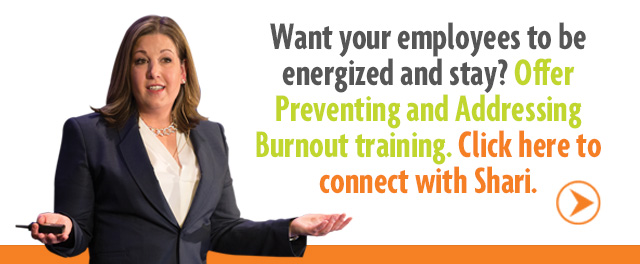
Leaders and managers work hard to retain employees. Employees watch how their organization’s leaders and managers work, and often make career decisions based on the hours the most senior people keep.
Employees pay attention to how often managers and senior leaders take time off and whether or not leaders attend meetings and respond to emails while they’re on vacation. Employees observe the late nights that leaders and managers put in and the emails sent at 11:00 pm and on the weekends. I’ve heard lots of employees say, “If I need to work like my boss works to get ahead in this organization, I’m not interested.”
Managers, one of the keys to retaining employees is to communicate expectations. If you’re available while you’re on vacation, but don’t expect employees to do the same, set that expectation. If you send an email outside of regular business hours but don’t expect employees to respond until the next business day, tell them so. They don’t know. Many employees assume that if you email them at night, you expect a reply.
Microsoft has made these situations easy to avoid, with the ability to program emails to go out during regular business hours. And some people state in their email signatures, “I work outside of regular business hours, but don’t expect you to.”

Instead of allowing employees to make assumptions about what managers do and don’t expect, set clear expectations. Be overt and clear. When you hire employees, tell them, “I work most evenings and weekends, but don’t expect you to do so. And I work these hours because I enjoy it, not because I have to. If I email you outside of regular business hours, I am not expecting you to reply.” Retaining good employees begins during the interview process when initial expectations are set.
Managers, if you expect employees to check and respond to emails outside of regular business hours and to be available while on vacation, tell candidates during the interview process.
Employees, if your manager emails you outside of regular business hours and doesn’t tell you whether or not she expects you to reply, ask. Simply say, “I often receive emails outside of regular business hours. How will I know when you need me to reply?” Likewise, if you notice your manager emails you on vacation, you can say, “I typically hear from you when you’re on vacation. Are you expecting me to check in while I’m off?”
The need to ask questions and set expectations goes both ways. Don’t wait to be told. Ask.
Managers and employees, ask these Candor Questions about working style preferences to aid in retaining employees:
- How do you feel about being contacted outside of regular business hours?
- If I need to reach you over a weekend or in the evening, what method is best?
- Would you prefer I text you so you don’t have to check your email outside of business hours?
- What time is too early and too late to call, text, and/or email?
Ask more. Assume less and make retaining employees easier.
I’m embarrassed how often I do things I don’t want to do because I’m afraid of looking bad. I agree to things I don’t want to do. I even suggest doing things I don’t want to do, because I think it will look bad if I don’t. Then I have deep regrets.
If I’m aware of this practice, why do I keep doing it, over and over and over? I suspect the need to look good and be liked is so pervasive, it over-powers reason and self-talk. Telling myself, “Don’t do it. You will regret this,” doesn’t help. The need for approval is all-powerful (to me).
My old boss told me many years ago, “Your need to be liked will kill you as a manager,” and he was right. It’s why I can’t interview my own candidates. I want them to like me too.
I suspect I’m not alone here. I lot of us say yes when we want to say no. We extend ourselves and regret it later.

What can be done, at an organizational level, to prevent ourselves and fellow employees from over-extending?
- Sanction, at a team and organizational level, that sometimes it’s ok to say no.
- Suggest that at times people take 24-hours before agreeing to take on a new task or project.
- Make room for negotiation, so people can say yes on terms that work for them.
Authenticity wins. Speak your truth and know that it’s ok.

The phrase Quiet Quitting is everywhere since appearing in a Tik-Tok video earlier in the year. Essentially quiet quitting is doing your job – just what is asked – not more and not less. Quiet quitters do good work during work hours, not on weekends and not at night. Quiet quitters don’t volunteer to do work outside the scope of their job, that they’re not paid to do.
Is there anything wrong with doing your assigned job and not more? No. Should you do it? If you want to. Should you use the phrase “quiet quit” at work or even with friends? No.
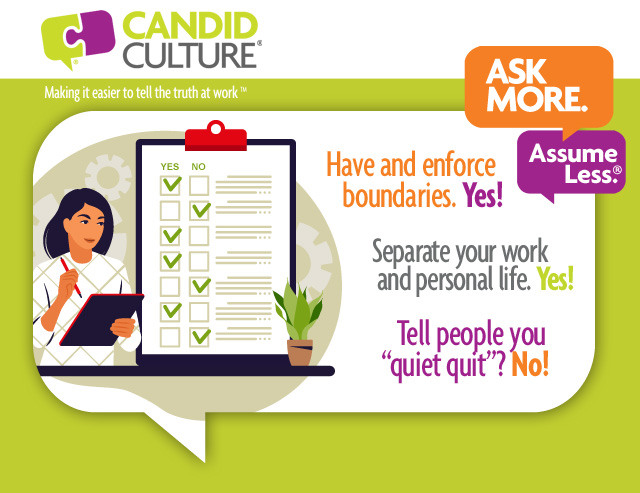
The definition of quiet quit is widely debated. Does it mean doing you minimal best, clocking it in, coasting, slacking, doing things other than work during work hours? It’s confusing and controversial.
The definition of the word quit is to leave, typically permanently. As a business owner who hires and works hard to retain team members, I don’t want my employees thinking of themselves as quiet quitters. It feels like a mentality – one foot out the door. And while the phrase quiet quit may not mean uncommitted, it has that connotation, so why use it?
If anything has become clear in the last almost-three years, it’s that many people want a different life. Many of us discovered that we enjoy being home, don’t want to commute long distances, travel for work, or miss family and social events because our jobs require it. So, let’s talk about that at work.
Employees – find the words to tell your boss what you need rather than labeling yourself with a controversial and confusing descriptor. Managers, find a way to talk with employees about what they need to be satisfied and stay in a job.
Employees and managers are often uncomfortable talking about the things that matter personally. Employees are often afraid to say what they need, for fear of being sidelined or fired. Managers are often afraid to raise the subject of what employees really need for fear of not being able to meet those needs. So, employees quiet quit and managers quietly hope for the best.
How about doing this instead – managers and employees meet individually, virtually, or in-person, every few weeks. Make a work-life check in a regular part of the conversation. Put the topic on the agenda to normalize the discussion and make talking about how work impacts personal an expected part of the conversation. Then start the discussion with something like, “I want us to be able to talk about how work fits in and supports your desired personal life. I want this job to support the vision you have for your life. I may not always be able to give you want, but I certainly can’t if I don’t know what those needs are.”
The world has changed, we have changed, and our needs have changed. We need to be able to talk about those changes without hesitation, worry, and fear. Instead of quiet quitting, schedule a conversation and open the discussion with something like, “I really enjoy my work here. There are a few things I’m realizing I need. Can we talk about it?”

I’m going to admit that I’m terrible at what I’m recommending today – taking time for yourself. Often my weekly blog is something I too am working on, and this week is no exception.
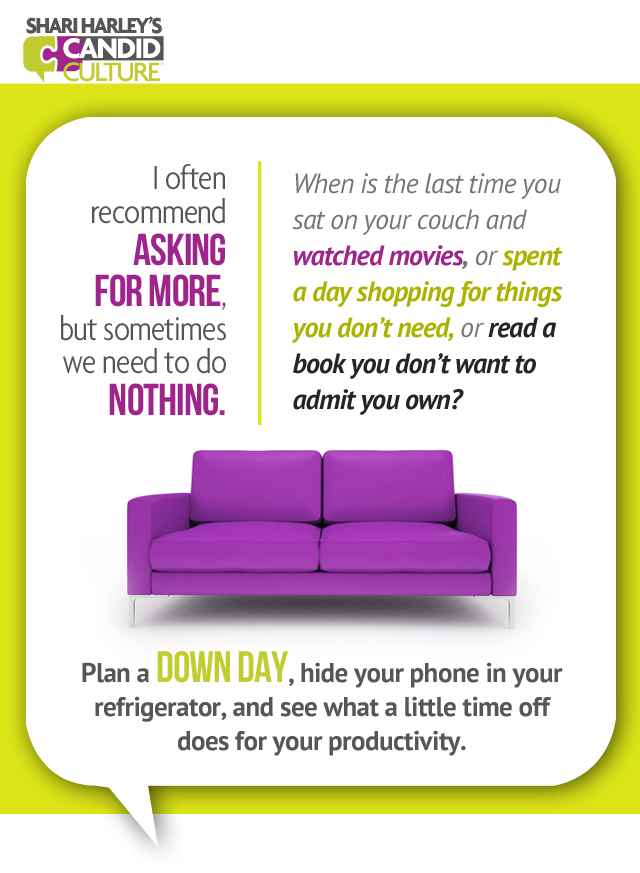
Many of you know that I have a small child and run a business. I work, travel, parent, and attempt to cook and keep my house clean. I’ll admit, I haven’t seen a gym or any form of real exercise since my son was born. I haven’t had lunch with a friend without my son in tow, haven’t seen a movie, and only talk to friends when I’m traveling.
The value of downtime and taking time for yourself is well documented. There is a lot written on the need to take breaks to recharge, rejuvenate, and avoid burn out. The question is how to do so without feeling like something else is getting short shrift.
Here are seven tips for taking time for yourself:
Taking time for yourself tip one: Give yourself permission after a really busy few days or week(s) to take a day and do nothing. If you’ve been on the road for four days or worked really long hours, plan to sleep in on the fifth day. Don’t schedule early morning meetings and a full day. Know that you won’t be productive on day five anyway, so you might as well plan to do very little, which is what you’re likely to do anyway.
Taking time for yourself tip two: Plan a day doing non-work-related things you really want to do. When is the last time you did something you really love to do, just because? You’re more likely to dedicate time off to doing something you love than just lying around. But, if a day of planned recreational activities feels like another ‘to do,’ you’re better off doing nothing and not feeling badly about it.
Taking time for yourself tip three: Plan time to see one or two friends a week. I’ll admit that I have to schedule phone calls to catch up with friends and schedule time to see people I care about. Yes, I admit, this seems wrong. But do whatever it takes. If you have to put lunch or a phone call with a friend in Outlook for it to happen, do it.
Taking time for yourself tip four: Don’t feel badly about taking time off. Many employees don’t take their allotted vacation time – for a variety of reasons. Just do what you need to feel rested and refreshed. Stop judging yourself.
Taking time for yourself tip five: If you take a day off or sleep late, don’t work until two in the morning the next day to compensate. Doing so defeats the purpose and will put you in a hole the next day.
Taking time for yourself tip six: Watch where your time goes when you’re ‘working.’ I know that I squander lots of time while I’m ‘working.’ I allow myself to get distracted reading emails as they come in, texting, and chatting in our office. You could work fewer hours if you reduced these distractions.
Taking time for yourself tip seven: Decide what you really want your life to be about and what’s really important to you. Do you want work to be your focus or do you want an equal balance of friendships, family, and community activities? You likely have what it is that you really want.
If what you really want is a career-centric life, then just admit that and don’t judge yourself for it. But do take enough time off that you are rested, productive, and don’t resent your work.

Each time we go to the pediatrician’s office, my son’s doctor tells me to relax and enjoy my son more. And each appointment, I’m surprised. “What do you mean,” I ask? “Don’t all parents come to each appointment with a typed list of questions?” Apparently not.
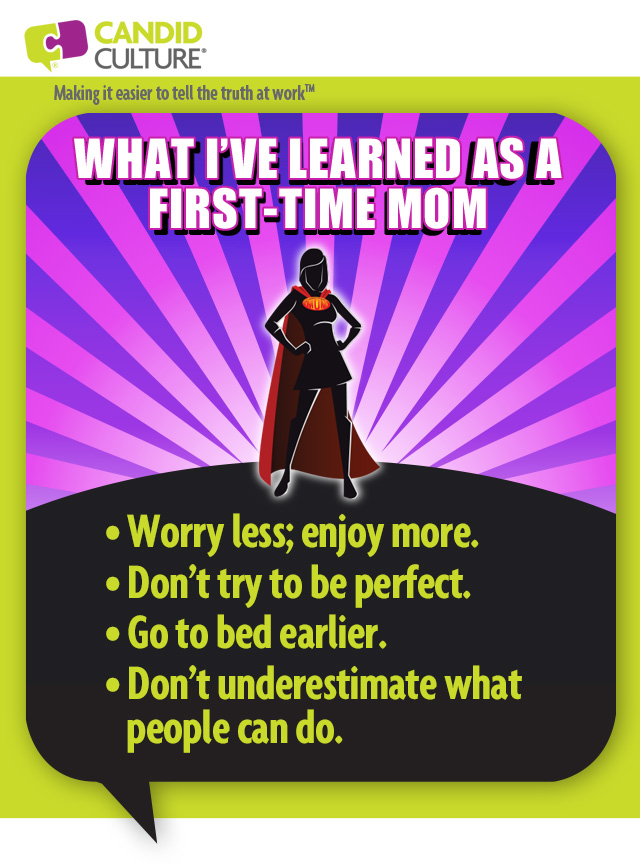
It’s unfathomable that last year at this time, I was getting ready to have a baby. Grayson’s first year has flown by, but not without a lot of lessons. The learning has been fast and at times painful.
Working parent lesson one: Stop trying to be perfect. I’m annoyed with myself, in all aspects of my life, for not being perfect. Regret is amplified with my son. Tonight he fell and shed blood for the first time in his young life. And I was standing right there. He hurt himself on my watch. As I replay the incident in my mind, all I can think is, “How did I let that happen and how do I prevent it happening again?” My family reassured me that every kid hurts himself and it will happen again and again. Intellectually I know this, and yet, I’m in denial about it, thinking if I’m vigilant enough, I can protect Grayson, ensuring that everything is always…perfect.
Working parent lesson two: Go to bed earlier. When Grayson was born I was given the sage advice, “Sleep when he sleeps.” I didn’t. And I’m writing this when I should be asleep. I’m more patient and present when I sleep. I’m a better parent, manager, leader, and business owner when I sleep.
Close out the email. Get off the internet. Go to sleep.
Working parent lesson three: One of my friends told me that most babies’ emergency room visits are for things the parents didn’t know the child could do. Yesterday Grayson crawled out of the tub unassisted. I didn’t know he could do that. He’d never done it before. Each time he does something he’s never done before, I’m caught off guard. He’s fast, agile, curious and smart. I can’t underestimate him. And this isn’t too different from work.
Don’t underestimate the people you work with. They’ll do great things, if you let them. Set big goals. Be clear in your expectations. Coach, support, and get out of the way.
Several people have asked me about my greatest surprise in parenting. I have to say, it’s the love. The huge, limitless, crazy love. Perhaps I need to extend it to myself, and stress less and enjoy more.
Happy first birthday to Grayson. My greatest love and teacher.





Posted under
Uncategorized on May 10, 2015 by Shari Harley. Comments
I’m going to admit that I’m terrible at what I’m recommending today – taking time for yourself. Often my weekly blog is something I too am working on, and this week is no exception.

Many of you know that I’m often in three to five states a week doing what I love most–working with all of you. When I get home, I often spend my evenings and weekends catching up.
While I feel I need to maintain this schedule to keep up, I’m aware that I can’t and don’t want to work all the time. So today’s blog is for all of us who don’t know how to turn it off and walk away from the laptop.
The value of downtime and taking time for yourself is well documented. There is a lot written on the need to take breaks to recharge, rejuvenate, and avoid burn out. The question is how to do so without feeling like something else is getting short shrift.
Here are seven tips for taking time for yourself:
Taking time for yourself tip one: Give yourself permission after a really busy few days or week(s) to take a day and do nothing. If you’ve been on the road for four days or worked really long hours, plan to sleep in on the fifth day. Don’t schedule early morning meetings and a full day. Know that you won’t be productive on day five anyway, so you might as well plan to do very little, which is what you’re likely to do anyway.
Taking time for yourself tip two: Plan a day doing non-work-related things you really want to do. When is the last time you did something you really love to do, just because? You’re more likely to dedicate time off to doing something you love than just lying around. But, if a day of planned recreational activities feels like another ‘to do,’ you’re better off doing nothing and not feeling badly about it.
Taking time for yourself tip three: Plan time to see one or two friends a week. I’ll admit that I have to schedule phone calls to catch up with friends and schedule time to see people I care about. Yes, I admit, this seems wrong. But do whatever it takes. If you have to put lunch or a phone call with a friend in Outlook for it to happen, do it.
Taking time for yourself tip four: Don’t feel badly about taking time off. I always feel guilty when I sleep until 11 am or do nothing until 3 pm on a Saturday. I still do it, but my enjoyment is diminished by my self-imposed judgment. Just do what you need to feel rested and refreshed. Stop judging yourself.
Taking time for yourself tip five: If you take a day off or sleep late, don’t work until two in the morning the next day to compensate. Doing so defeats the purpose and will put you in a hole the next day.
Taking time for yourself tip six: Watch where your time goes when you’re ‘working.’ I know that I squander lots of time while I’m ‘working.’ I allow myself to get distracted reading emails as they come in, texting, and chatting in our office. You could work fewer hours if you reduced these distractions.
Taking time for yourself tip seven: Decide what you really want your life to be about and what’s really important to you. Do you want work to be your focus or do you want an equal balance of friendships, family, and community activities? You likely have what it is that you really want.
If what you really want is a career-centric life, then just admit that and don’t judge yourself for it. But do take enough time off that you are rested, productive, and don’t resent your work.

 You have too much to do and not enough time. Something has to go. You have four choices:
You have too much to do and not enough time. Something has to go. You have four choices:
- Get further behind at work
- Have less fun
- Spend less time with your kids, spouse and/or friends
- Sleep less
Most people forgo sleep in favor of work, fun, and time with family and friends. But this choice, like all choices, has consequences.
I’ll admit to being a bad sleeper. I stay up too late stalking people on Facebook who I don’t care about. Then I wake up in the middle of the night to use the facilities and have trouble falling back to sleep. Instead of quieting my mind, I make to-do lists on my phone, which, yes, I sleep with. I am quite functional with five hours of sleep for one or two days. The third day I’m a disaster – cranky and unproductive.
Most people need more sleep than they’re getting. With enough sleep everything works better. With a lack of sleep nothing seems to work. We would actually increase productivity if we slept more. Mornings would start better, days would be more efficient, and the people we work and live with would like us more.
But the problem remains, most people don’t feel they have enough time. And something has to go.
Here are a few things I’m trying to increase productivity:
- Set realistic goals. I’m probably not going to go to be at work at 8:00 am, go to the gym, and see friends five days a week. Three days is more realistic.
- Put the phone on the other side of the room when I go to bed, so it still serves as an alarm clock but isn’t within arm’s reach.
- Don’t read or reply to email in the middle of the night.
- Wind down earlier. Start getting ready for bed 30 minutes before I want to go to sleep.
- Accept that I need more sleep and that while four or five hours worked while I was in college, I’m no longer 20.
- Realize that when I get seven hours of sleep I’m nicer to be around. I feel better and am more productive.
When human beings sleep seven or eight hours a night we are more focused, happier and we increase productivity. Thus sleeping more actually creates more time.
Commit to feeling better and enjoying your work and personal life more by getting more sleep. But if you opt to stay tired and cranky, email me at 3:00 am and we’ll catch up.






















 You have too much to do and not enough time. Something has to go. You have four choices:
You have too much to do and not enough time. Something has to go. You have four choices: